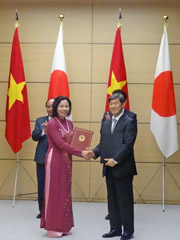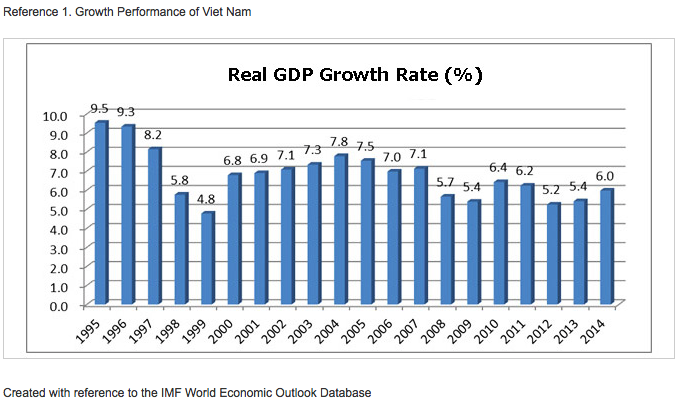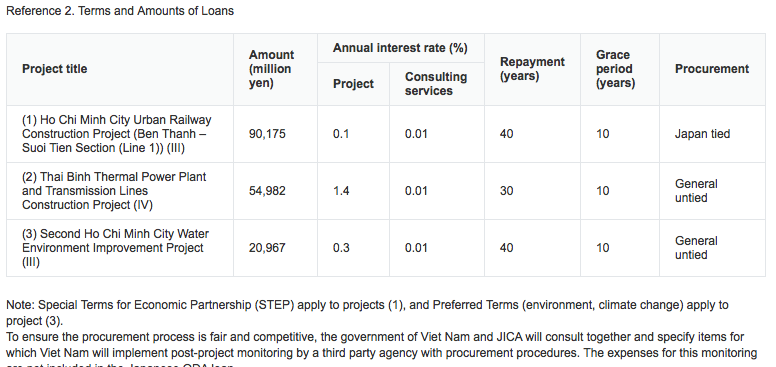Japan International Cooperation Agency [Thursday, Jun 2, 2016]
Signing of Grant Agreement with Myanmar: Strengthening the capacity to fight foot-and-mouth disease to support stability and the development of the agricultural and livestock industry
On June 2, the Japan International Cooperation Agency (JICA) signed a grant agreement (G/A) with the Government of the Republic of the Union of Myanmar to provide grant aid of up to 1,417 million Japanese yen for the the Project for Improvement of Foot-and-Mouth Disease Control.
This project will provide facilities and equipment for the diagnosis of foot-and-mouth disease and the production of vaccinations to the National Foot-and-Mouth Disease Laboratory in Yangon, strengthening the laboratory’s capacity to implement measures for foot-and-mouth disease and stabilizing the production of livestock products in Myanmar.
The livestock industry accounts for approximately eight percent of the gross domestic product in Myanmar, which has 18 million heads of cattle and water buffalo, the largest number of any ASEAN nation. In addition to use for plowing and hauling, cattle and water buffalo play an important role in improving the income of farmers and ensuring a food source in rural areas with a high poverty rate through the use of their manure for fertilizer and the sale of their meat and dairy products. Unfortunately, however, there continue to be breakouts of foot-and-mouth disease every year in Myanmar. Highly contagious, foot-and-mouth disease affects hoofed mammals through viral infection, impacting agricultural productivity and causing severe economic loss for livestock farmers.
With the movement of livestock across national borders, there is a danger of a chain reaction in the scope of infection, and measures are therefore needed on a regional scale. JICA has assisted the fight against foot-and-mouth disease throughout the ASEAN region through wide-area technical cooperation projects in Cambodia, Laos, Malaysia, Thailand and Vietnam, as well as Myanmar.
The facilities and equipment to be provided to Myanmar for diagnosing foot-and-mouth disease and for producing vaccines through this project will make it possible to produce enough vaccines to meet the demand (around one million doses per year) to curb the spread of the disease. In addition to improving the lives and incomes of livestock farmers by making livestock production stable, this project is expected to contribute to further livestock industry development throughout the ASEAN region.
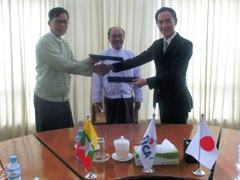
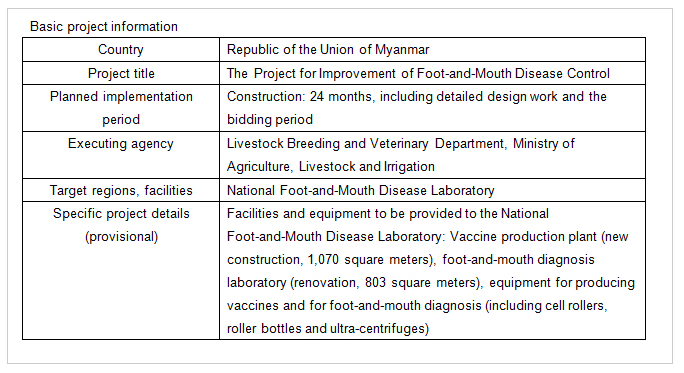
Japan International Cooperation Agency [Monday, May 30, 2016]
Signing of Japanese ODA Loan Agreements with Viet Nam: Building infrastructure to strengthen international competitiveness and overcome vulnerabilities
On May 28, the Japan International Cooperation Agency (JICA) signed Japanese ODA loan agreements with the Government of the Socialist Republic of Viet Nam to provide loans of up to a total of 166.124 billion yen for assistance forthree projects.
Since the 1990s, Viet Nam has maintained steady economic growth (see reference 1). By 2010, Viet Nam achieved status as a lower middle-income country, which had been a national goal, and successfully reduced its poverty rate.* In a process that began last year, tariffs are being abolished in stages within the ASEAN region. In order to maintain sustainable economic growth while progressing toward the goal of industrialization by 2020 under these new circumstances, Viet Nam must make economic structural and governance organizational reforms, including improvements to the financial system and to infrastructure to improve the investment environment. Taking these steps will create mid to long-term macroeconomic stabilization and strengthen international competitiveness. Viet Nam must also address its vulnerabilities by raising the income of rural residents who make up about 70 percent of the country’s population and have a higher poverty rate than urban regions, and by improving public sanitation, which worsens with urbanization.
Given this situation, these Japanese ODA loans will provide support for building the economic infrastructure essential to strengthening Viet Nam’s competitiveness, and for promoting environmental improvements to overcome the country’s vulnerabilities. The features of the four projects are summarized below.
(1) Support for economic infrastructure to strengthen international competitiveness
By constructing an urban railway, the Ho Chi Minh City Urban Railway Project (Ben Thanh–Suoi Tien Section (Line 1)) (III) will alleviate traffic congestion and air pollution while encouraging regional economic development. The Thai Binh Power Plant and Transmission Lines Construction Project (IV) will construct a power plant that uses coal produced in Vietnam, as well as building related facilities, to meet the pressing demand for power. These projects will promote economic development in Vietnam and strengthen the country’s international competitiveness.
(2) Support to overcome vulnerabilities
The Second Ho Chi Minh City Water Environment Improvement Project (III) will construct sewerage and drainage systems to improve the water treatment capacity of Ho Chi Minh City and reduce flood damage.
JICA’s policy is to dynamically implement projects that address development issues in Viet Nam while coordinating JICA’s various types of assistance, which include Japanese ODA loans, technical cooperation and grant aid.
* According to the “Country Report: 15 years achieving the Viet Nam Millennium Development Goals” by the United Nations Development Programme, the poverty rate in Viet Nam dropped from 37.4 percent in 1998 to 8.4 percent in 2014.
